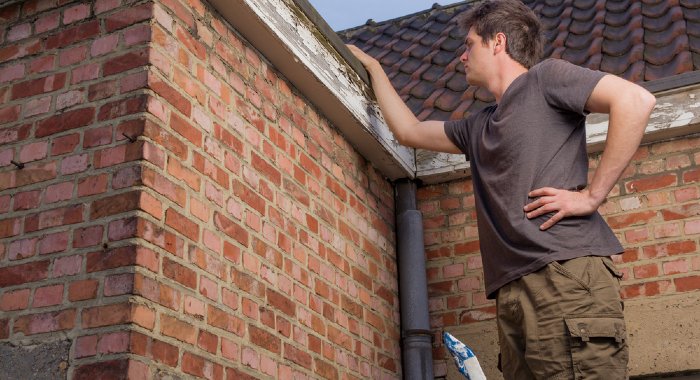It’s no secret that an investigation into your asset is an important part of the home selling process, but many sellers will feel anxious and nervous about a house survey and what to expect from such a report.
That’s because a property survey can be a daunting experience for any seller who may be fearing the worst, but it doesn’t have to be.
Here, the Property Road team offers information about what a home seller should expect from this important step in the home selling process.
It’s all based on our own experience selling properties and the numerous times we’ve been nervous about the survey!
What is a house survey?
Firstly, let’s look at what a house survey is from the home seller’s perspective.
While the house seller doesn’t need a survey carried out, it will bring peace of mind if they are worried about what a survey may reveal about the property they want to sell.
Put simply, a house survey is an inspection of the property that is being sold, and it is carried out by a qualified surveyor.
There are two main types of house survey: a Home Buyer Report or a Full Structural Survey.
- A Home Buyer report is a less intrusive and less expensive option and will assess the condition of the property, highlight any major problems, and provide an estimate of the value of the property.
- A Full Structural survey is a more comprehensive option and will assess the condition of the property in greater detail, including any hidden structural problems.
The purpose of the survey is to assess the condition of the property and to identify any potential problems that could affect the sale.
When you sell your home, it is the home buyer who decides which type of house survey they should have carried out.
But there’s nothing to stop a house seller from also commissioning a surveyor’s report so they are aware of any potential issues – especially problems that may lead to a reduction in the selling price.
Who carries out a house survey?

Your surveyor should be a member of one of these organisations:
- The Royal Institution of Chartered Surveyors (RICS);
- The Residential Property Surveyors’ Association (RPSA);
- Sava.
They will be qualified and experienced in carrying out this type of assessment and will be able to identify any potential problems with the property.
Depending on the type of report that the home seller buys, the surveyor will put together a report detailing the issues of concern.
If the surveyor identifies any problems with the property, it is important to get these repaired before putting your house on the market.
This will help to ensure that the sale goes ahead smoothly and without any delays.
Is a surveyor’s report important for a home seller?
The answer is ‘Yes’ if you are a house seller that is worried about what might be contained in the surveyor’s report.
Also, one piece of research from property data firm TwentyCi highlights that more than 300,000 house sales fell through in 2020 – a rise of 12% from the year before.
And most of those sales fails will be down to problems highlighted in the surveyor’s report.
The most common house survey problems
The surveyor’s report will identify potential problems with the property, such as structural issues, dampness, or wood rot.
It is important to note that their role is simply to assess the condition of the property and to provide a report to the buyer or seller. They aren’t there to carry out repairs of any kind.
The most common problems that RICS surveyors find are:
- Cracks in walls;
- Damp patches;
- Mould growth;
- Hole in the roof;
- Loose tiles;
- Wiring issues;
- Plumbing problems.
Other house survey problems may highlight asbestos, structural movement, Japanese knotweed and other invasive plants, drainpipe problems, and electrical issues.
The survey also highlights whether your property has the correct level of insulation, and this tends to be a common issue though it’s easy to fix.
If you are nervous about the house survey, don’t be!
However, if you have had any work carried out, for example, building an extension, then you will need the relevant paperwork to hand showing planning permission. Not following building regulations can be a serious issue when you come to sell.
A professional surveyor will know what to look for when it comes to the most common house survey problems and provide you with a report that will help you make an informed decision about selling your house and what repairs may be necessary.
Is it a good investment for a seller to have a house survey?
As a seller, you may be wondering if it’s worth your while to have a house survey. After all, surveys can be costly and time-consuming.
However, the benefits of having a house survey outweigh the costs. Here’s why:
- A house survey can give you peace of mind
As a seller, you may be worried about potential problems with your property that could scupper the sale. A house survey can put your mind at ease by identifying any issues that need to be addressed.
- A house survey can help you negotiate a better price
If the survey reveals any problems with the property, you may be able to negotiate a lower price with the buyer. This could save you money in the long run.
- A house survey can make your property more attractive to buyers
If your property has a clean bill of health, this will make it more attractive to potential buyers. This could help you sell your property more quickly and at a higher price.
Should I worry about the homebuyer’s survey?

It is completely natural to worry about the outcome of a homebuyer’s survey because you want the house selling process to be smooth.
However, there’s no point in you worrying about the report – until you find out that there is something to worry about.
And, if there is, it’s likely that the problem can be fixed, and you will inevitably need to spend money doing so.
Don’t forget too that when you moved into your home, you would have had a survey carried out which would have highlighted any potential problems – and it’s unlikely that anything serious will have developed since then.
Selling A Property? FREE Step-By-Step Platform
Our experiences as sellers worried about a house survey
I’m naturally a bit of a worrier and so surveys have always been a bit of a concern to me. After all, you’ve got so far down the process, you don’t want things to fall through at this stage!
When we sold our first property, I remember being quite concerned about the survey. There was nothing particularly wrong with the property but I was convinced something would be found. In the end, I worried for nothing and we moved without an issue.
However, I had much more reason to be fearful the next time we moved. When we had bought the property our survey had highlighted structural issues and we’d had to have a full structural survey done. Thankfully this re-assured us there were no major issues but I was worried all of this would come up again.
Our buyer decided to leave the survey very late in the process too which added to the stress. When he booked the survey I found out it was a Homebuyer’s Report which is a general survey.
I made sure I was home for when the survey was conducted (though the surveyor won’t discuss much with you) and I got a copy of the structural engineer’s report ready.
When the surveyor arrived I was honest about what had been found on our survey and told him we had also had a structural engineer’s report done and there was a copy available to him. Thankfully he accepted the structural engineer’s report as a higher level than the report he was doing.
As a result, he didn’t bring up any of the concerns that had been brought up in our original survey. All he mentioned were a few minor damp issues that we were able to resolve easily with our buyer.
So, if you’re really worried about a specific issue, just remember you can always have a specialist report done yourself. Any future surveys will likely take the specialist report into consideration.
How can a seller prepare for a survey?
Firstly, there’s no obligation for someone selling a property to do anything to their home before a surveyor comes to inspect it.
You may decide that you want to get your property looking as nice as possible so you should look at removing mould on bathroom tiles, for example, fixing dripping or leaking taps and filling in cracks that may be in ceilings and walls.
It’s also a good idea to tidy up so that the surveyor can work quickly without having to clear away items that they may suspect are disguising a major problem.
It is also an idea to tidy up the garden because among the checklist of items on a survey is to determine whether Japanese knotweed exists on your property.
What can I do when the house survey is bad?
As the seller, if the house survey that you have commissioned is bad, then you need to consider:
- Postponing your house sale until the problems are fixed;
- Negotiate a price with the buyer for them to fix the issues.
It’s worth bearing in mind that if the buyer decides to pull out, the issues will need to be resolved because you will go through the same performance with a new buyer.
This happed to one vendor when we had to pull out of buying their home due to a bad survey. In hindsight it was a probably the surveyor being over-cautious. However, their report was enough to make us think the house hadn’t been cared for and likely had hidden issues.
After we pulled out we provided a copy of the survey to the sellers and, to be fair to them, they appeared to have rectify most of the issues before they later put the property on the market. They then sold to a new buyer pretty quickly.
Even if you are nervous about a property report, you should always be honest and open with a potential buyer to discuss any issues you may have to help ensure that the house sale goes through.
What should I do if there are problems with my property?
Having looked at the potential issues, it’s worth looking at how to resolve the problems that are flagged up for your home.
If the surveyor identifies problems with the property, it is important to get these repaired before putting your house on the market.
Also, don’t lose sight of the fact that a house survey is a normal part of the home selling process, so there is no need to worry.
For example, one major issue that might be highlighted is that your home might have structural problems.
Now, if you have had the most common survey, that’s the homebuyer report, this is done by a general surveyor.
If they see a potential issue with the structure, they usually recommend a further specialist report be done and that alone can put off buyers.
The homebuyer’s report might highlight, for example, that there might be subsidence that needs underpinning.
If so, you will then need a structural engineer’s report done which will look in-depth at the situation.
They might recommend underpinning – which you will have to carry out – or, they might say there is nothing to worry about.
Getting a second opinion as a house seller

If the surveyor’s report does highlight a problem with your home, you’ll need them to explain thoroughly how you can go about fixing them.
This may also be the time to get a second expert opinion on the issues raised and this may include contacting a specialist, a builder, or a tradesman.
You’ll be needing their opinion on how severe the issue might be – and how quickly it can be fixed and what the cost will be.
Again, this may be an issue for the buyer to consider so you need to know what the costs are to negotiate the selling price.
However, depending on what the problem is you want to encourage buyers to complete their purchase so you may need to fix the problem before you sell.
If so, you’ll need at least two quotes from builders, for example, to compare the price and scope of work needed.
It’s also worthwhile finding someone who is independent, don’t rely on a specialist that is recommended by an estate agent or even the buyer.
You also need to know from your survey report how urgently work needs completing and you need to work quickly to find quotes and then begin work if it’s crucial.
That’s because you don’t want to put off a potential buyer and you want to ensure that the money you spend on your home is a sound investment.
Telling your potential buyer about any issues
If you do decide to have a surveyor’s report done, it’s worth telling the potential buyer that you have had it done and nothing was reported.
It’s also worth noting that if you did follow up on a surveyor’s report with a specialist investigation, for example, the issue above of having a structural engineer’s report carried out, then you should pass this information on.
This will help make your property more attractive because the buyer will know they can proceed with confidence.
Treat your surveyor’s report as a viewing
There’s no point in a home seller being nervous about a house survey and what the report might say.
Not when it is your report, so you have the time to remedy any issues that are raised in it.
Essentially, you should treat the survey like a viewing.
For example, have a deep clean and tidy everywhere to deliver a great first impression – and having a surveyor’s report to hand might help the conversation flow with a potential buyer.
Having a glowing surveyor’s report is like having the cherry on the cake!
And, if there are issues, you can either:
- Pay to have the issues resolved;
- Negotiate with a buyer and discuss lowering the price to account for repairs.
If you are nervous about a house survey, this is also a good time to utilise the expertise of your solicitor and estate agent for advice about what to do when repair work is necessary – they also want your house sale to go through quickly and will be prompt and supportive with help.





